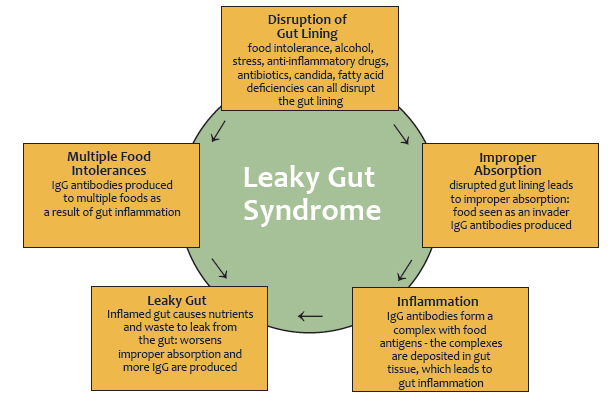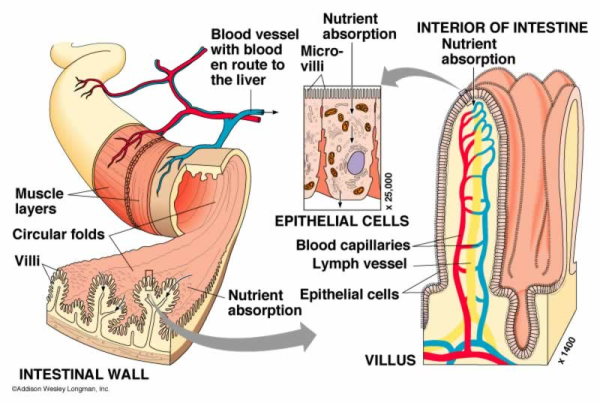-

With leaky gut not only is the digestive lining more porous and less selective about what can get in, but normal absorption can also be affected
With leaky gut not only is the digestive lining more porous and less selective about what can get in, but normal absorption can also be affected
Leaky gut Inflammation can be a difficult diagnosis to establish for a number of reasons: It’s associated with a wide range of seemingly unconnected symptoms; it has a lot of different causes; there’s no specific test to confirm it; and evidence tying it to other conditions can be murky. As a result, there’s a fair amount of skepticism in the mainstream medical community about the legitimacy of leaky gut as a diagnosis. But as the evidence that this is indeed a real and recognizable condition grows, opinions are slowly changing. That’s a good thing, because leaky gut is likely to emerge as one of the most significant medical concepts of our time.
The digestive lining serves is an important barrier function. It’s like a sieve with very tiny holes allowing only small substances to go through, while keeping out larger undesirable particles. With leaky gut, also known as increased intestinal permeability, the net becomes damaged, resulting in bigger holes that allow more things to pass through that ordinarily couldn’t.
When the barrier function becomes compromised, then bacteria, viruses, undigested food particles and toxic waste products can leak from the inside of your intestines through the damaged digestive lining into your bloodstream, where they’re transported throughout your body and can trigger your immune system to react. The end result is inflammation in various parts of your body, leading to a wide variety of symptoms of Inflammation like bloating, cramps, fatigue, food sensitivities, flushing, achy joints, headache and rashes.
With leaky gut not only is the digestive lining more porous and less selective about what can get in, but normal absorption can also be affected. Nutritional deficiencies may develop as a result of damage to the villi – the finger-like projections in the small intestine that are responsible for absorbing nutrients.
Multiple food sensitivities are another hallmark of leaky gut, because partially digested particles of protein and fat may leak through the intestinal wall into the bloodstream and cause an allergic response as a result of inflammation. Increased intestinal permeability may potentially cause or worsen a number of other conditions, including Celiac disease, inflammatory bowel disease (IBD, which includes Crohn’s disease and ulcerative colitis), irritable bowel syndrome (IBS), arthritis, psoriasis, eczema and asthma.
So what causes increased intestinal permeability? There’s still much to be learned, but diet, chronic stress, certain medications and bacterial imbalance seem to play important roles. Eating a diet high in refined sugar can lead to overgrowth of yeast species, which has been associated with leaky gut. Preservatives and chemicals in processed foods can damage the lining, and so can consumption of gluten – a protein found in wheat, rye and barley.
Chronic stress can lead to a weakened immune system, affecting your ability to fight off invading bacteria and viruses and worsening the symptoms of leaky gut. Medications like aspirin and non-steroidal anti-inflammatory (NSAIDs) that can damage the lining of your gut, as well as antibiotics that kill off your essential good bacteria are also associated with increased intestinal permeability. In fact, an imbalance between beneficial and harmful species in your gut called dysbiosis is one of the leading theories about what causes increased intestinal permeability. Excessive alcohol consumption, infection with parasites, radiation and chemotherapy can damage the lining of the intestine and are also risk factors.
In addition to bloating and digestive distress, a lot of the patients I see with leaky gut have a combination of other symptoms like food allergies, chronic sinus infections, achy joints, fatigue, brain fog or unexplained rashes. Typically they’ve been to multiple doctors trying to make sense of their symptoms, and conventional tests and imaging studies have been unrevealing. There can be a feeling of hopelessness and despair, because the symptoms seem so unrelated. With all these infections cropping in it becomes clear that the body becomes sick and as a result weight loss becomes practically impossible.
When you think of leaky gut not so much as a disease, but as a mechanism by which a number of different conditions can develop, it starts to make sense. A leaky gut is the pathway for how toxins enter the body through the GI tract and create all kinds of mayhem once they’re in, sort of like party crashers who slip through security and proceed to make a mess of the venue.
There’s no miracle cure for treating leaky gut, but there are things you can do if you’re suffering from it that can help heal inflammation and restore the integrity of your gut lining.
An anti-inflammatory diet that eliminates refined sugars, dairy, gluten, alcohol and artificial sweeteners – some of the biggest offenders when it comes to inflammation – can be very helpful. Consuming lots of anti-inflammatory essential fatty acids in fish and nuts, and filling up on green leafy vegetables, high-fiber and fermented foods that help to promote the growth of good bacteria is also crucial.
A robust probiotic that contains large amounts of good bacteria can help heal a damaged intestinal lining by restoring balance in the gut flora.
Supplements like glutamine have been shown in some studies to help with intestinal injury after chemotherapy and radiation and may be beneficial in leaky gut.
Most people will notice improvement within 6 weeks, although it may take several months and even years to heal a damaged intestinal lining in extreme cases of leaky gut. Because we’re still learning about leaky gut, many of the treatment guidelines are drawn more from anecdotal observation than from rigorous scientific studies. But they’re sensible recommendations that can lead to improvements in your overall health, whether or not you have increased intestinal permeability.
Leaky gut is one of those diagnoses that bridges the gap between conventional and alternative medicine, between what we can see and touch and what we can feel in our bodies. I refuse to believe that the hundreds of patients I see in my office with unusual and seemingly unrelated complaints are crazy, or just stressed out.
I believe them when they say they feel like they’re being poisoned, or that they think there’s a connection between all their symptoms, even though they don’t know what it is. My hunch is that as our knowledge grows, the theories behind leaky gut will become the foundation for lots of diseases that are widely prevalent in our society, and millions of people will be in a better position to find relief from their suffering.
























